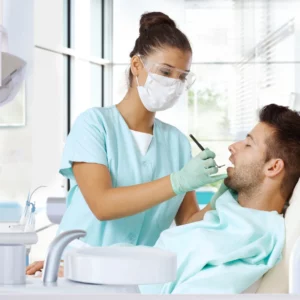OBSTRUCTIVE SLEEP APNEA

Sleep is an essential aspect of our lives, promoting overall well-being and rejuvenation. However, for individuals with obstructive sleep apnea (OSA), sleep can become a challenging and disruptive experience. This condition affects millions of people worldwide, causing various health issues and impacting their quality of life.
What is Obstructive Sleep Apnea (OSA)?
Obstructive sleep apnea is a sleep disorder characterized by repetitive partial or complete blockage of the upper airway during sleep, leading to interruptions in breathing. These disruptions can last for seconds to minutes and occur multiple times throughout the night, hampering the natural sleep cycle.
Risk Factors
Obstructive sleep apnea can affect individuals of any age or gender, although certain factors increase the risk. Obesity, excess weight around the neck, advancing age, family history, and certain medical conditions such as hypertension and diabetes contribute to the likelihood of developing OSA. It is estimated that approximately 20% of adults worldwide may have some degree of sleep apnea.
Anatomy of the Airway
The airway anatomy plays a significant role in the development of obstructive sleep apnea. When the muscles supporting the throat relax excessively during sleep, the airway narrows or becomes completely blocked. This can occur due to factors such as obesity, enlarged tonsils, or structural abnormalities. As a result, the airflow is impeded, leading to disrupted breathing patterns.
Common Symptoms and Signs
Recognizing the symptoms of obstructive sleep apnea is crucial for timely diagnosis and intervention. Some common signs include:
- loud and persistent snoring,
- gasping, or choking sounds during sleep,
- excessive daytime sleepiness,
- morning headaches,
- difficulty concentrating,
- and irritability.
Partners may also notice episodes of breathing cessation followed by sudden awakenings.
When suspected, the diagnosis of obstructive sleep apnea is typically confirmed through a sleep study or polysomnography. This comprehensive test monitors various parameters during sleep, including brain waves, breathing patterns, oxygen levels, and heart rate. It helps assess the severity of sleep apnea and guides treatment decisions.
Effects of Obstructive Sleep Apnea on Health
Untreated obstructive sleep apnea can have significant implications for overall health and well-being. It is associated with an increased risk of cardiovascular problems, including high blood pressure, heart disease, and stroke. Additionally, OSA can impair cognitive function, leading to difficulties with memory, concentration, and decision-making. Daytime sleepiness and fatigue can also affect productivity and quality of life. Studies have also shown a link between sleep apnea and conditions such as diabetes, metabolic disorders, and mood disorders like depression.
Treatment Options:
Managing sleep apnea involves various treatment modalities tailored to individual needs. Lifestyle modifications, such as weight loss and regular exercise, can have a positive impact on sleep apnea symptoms. For moderate to severe cases, continuous positive airway pressure (CPAP) therapy is often recommended. This involves wearing a mask during sleep that delivers a constant flow of air, keeping the airway open.
Oral appliances that reposition the jaw or surgical interventions may be considered in certain cases. There are various types of oral devices available for the treatment. The most common ones include mandibular advancement devices (MADs), tongue-retaining devices (TRDs), and palatal lifting devices. Oral devices offer several advantages as a treatment option, they are non-invasive, portable, and generally well-tolerated. Unlike CPAP therapy, oral devices do not require a constant supply of electricity, making them more convenient for travel.
Custom-fitted oral devices, made by dental professionals, provide a better fit and offer optimal effectiveness. Over-the-counter devices, while more affordable, may not provide the same level of customization and may not be as effective in managing obstructive sleep apnea.
Managing OSA for Better Sleep
In addition to medical interventions, certain practices can promote better sleep for individuals with obstructive sleep apnea. Following good sleep hygiene practices, such as maintaining a regular sleep schedule, creating a comfortable sleep environment, and avoiding stimulants before bedtime, can improve sleep quality. Adapting to CPAP therapy and ensuring adherence to the treatment regimen is crucial for its effectiveness. Support from healthcare providers and loved ones can make this journey easier and more manageable.
Frequently Asked Questions
What causes obstructive sleep apnea?
Obstructive sleep apnea is primarily caused by the relaxation of the throat muscles during sleep, which leads to the narrowing or complete blockage of the airway.
How does obesity contribute to sleep apnea?
Obesity increases the likelihood of developing obstructive sleep apnea by contributing to excess soft tissue around the neck, which can obstruct the airway during sleep.
Can children have sleep apnea?
Yes, children can develop sleep apnea, often due to enlarged tonsils or adenoids. It can affect their growth, development, and academic performance if left untreated.
Are there any natural remedies?
While lifestyle changes like weight loss can help, natural remedies alone may not cure sleep apnea. Consulting a healthcare professional for appropriate treatment is crucial.
Can sleep apnea be cured completely?
While some lifestyle changes and treatments can effectively manage sleep apnea, complete cure may not be guaranteed. However, symptom relief and improvement in overall health are achievable goals.
How can partners cope with a snoring spouse?
Partners can support their loved ones with sleep apnea by encouraging them to seek medical help, promoting healthy sleep habits, and considering earplugs or white noise machines for better sleep.
What should I do if I suspect I have obstructive sleep apnea?
It is important to consult a healthcare professional who specializes in sleep medicine. They can guide you through the diagnosis process and recommend appropriate treatment options.
Get in touch with our team at Heritage Dental Group on 38783384.
